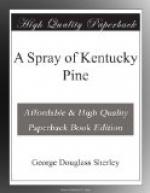James Whitcomb Riley!
James Whitcomb Riley!
James Whitcomb Riley!
Smiling, undulating, across the Creek, a Blue Grass Meadow gently rolls away, toward the White, the Winding Pike: Each blade of Blue Grass—Joyfully, not Tearfully—seems to whisper your Name:
James Whitcomb Riley!
James Whitcomb Riley!
James Whitcomb Riley!
But Hark! The belated Song of
a Mocking Bird—
its Vesper Song—to its enraptured Mate!
This, the Glad Song:
To You James Whitcomb Riley! The World was full of Roses! Every Rose held hidden, within its Tremulous Heart, a Slender Crystal Chalice of Perfumed Dew, which, overflowing, spilled its Prodigal Sweetness, onto the Earth, into the Air,
For You James Whitcomb Riley!
—For You, and for All Humanity!
And this, the Joyful Refrain:
—Joy, without Regret!
Joy, without Mourning!
Joy,
without Tears!—
—A Refrain which readily, willingly,
finds Grateful Echo in the Heart of
This Man From Down On The Farm!
O! James Whitcomb Riley!
All Is Well With You!
All Is Well With You!
O! James Whitcomb Riley!
All Is Well With You!
O! James Whitcomb Riley!
[Illustration]
Postlude
—Which ought to have been The Prelude to this Spray of Kentucky Pine. Because it was written, published, a little more than a year before the Death of the Poet. Therefore, it was a Tribute to him, Living!
A Promethean Poet was there. He had touched the Heavenly flame; he had lasted the Waters of Inspiration: he had drained the Crystal Cup of Fancy, finding therein neither Lees nor Dregs, which bite the tongue, stifle the song, of lesser Men; he had reverently kissed the coy hand of Fame, when she had crowned his Worthy Brow, with her Wreath Immortal! His Poems, homely, simple, sweet—springing from the lap of Nature—had spread, like wild-fire of the Forest, into the Four Quarters of the Globe. He came from the Land, across the River, where, in these latter days, the People quit the planting of the Potato, to pen a Poem: pause in the cultivation of the Corn, to compose a Novel. Some of it is good, very good; Some of it is bad, very bad: but all of it produces a princely Revenue far in excess of any return from either the Potato or the Corn. Long before the avalanche-like advent of this State- wide Literary Madness, the Star of this Poet had risen— risen before, and still shines beyond, and above them all. The hand which wrote “Goodbye, Jim”—not classical in either Greek




